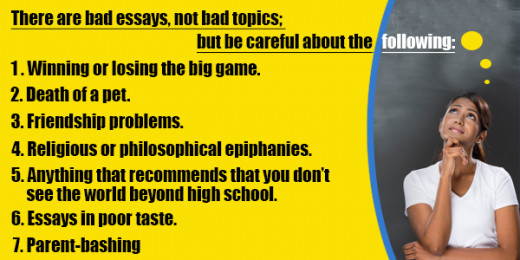Writing a Successful College Admissions Essay

College Admission Essays can mean the difference between acceptance and rejection. It may be 500-700 words or even shorter but these essays show the admission committee how unique and different you are as a student compared to the rest of them. Admission Essays provide information about a student’s grades, test scores and extra-curricular activities. A student can use the Admission essay to define a favorite action, to tell a story about self, or even a story about his/her dog, etc. What has to be kept in mind is that the essay must be used in ways that capture the reader’s attention and shows the student is exceptional?
With more and better prepared students applying to college, the admissions process has become a lot more competitive. Hence it’s important a student must distinguish themselves from the rest. Though essays and personal statements include only a part of the total application process, they have become a serious factor. The personal information included in the essay makes a student more than just a compiling of test scores and records. Applications to graduate and professional school often need a personal or autobiographical statement.

Some Interesting Topics for Admission Essays are:
- As you reflect on life thus far, what has someone said, written, or expressed in some fashion that is especially meaningful to you. Why?
- A One-Act Play
- Evaluate a significant experience, achievement, risk you have taken, or virtuous dilemma you have faced and its impact on you.
- Given your personal background, describe an experience that illustrates what you would bring to the diversity in the college community.
- If you could have lunch with any person, living, dead, or fictional, who would it be and what would you discuss?
- Discuss an issue you once thought you knew with certainty that you have since re-evaluated. What provoked you to change your opinion?
There are bad essays, not bad topics; but be careful about the following:
- Winning or losing the big game.
- Death of a pet.
- Friendship problems.
- Religious or philosophical epiphanies.
- Anything that recommends that you don’t see the world beyond high school.
- Essays in poor taste.
- Parent-bashing.
Types of Admission Essay
There are two types of admissions essays.
One is a personal statement which is common in nature and gives the student an opportunity to tell the admissions counselor more about you or about events and people that have influenced you. The second type of admissions essay involves answering a specific question with a more organized response. These questions cover a wide range of topics and can be creative, logical, or theoretical.
Guidelines and Purpose of Admission Essay
Guidelines to write the Admission Essay
- Whether your topic is a structured question or a personal statement, take ample time to think through what the writing prompt is asking you to do.
- Think of many ways to approach the topic before you select one approach or a combination of several.
- When you have settled on an approach, make lists of details, memories, and connotations.
- Make a plan for the essay. Whether formal outline is to be used or not, a plan helps connect ideas efficiently and gives a sense of beginning, middle, and conclusion.
- Write a first rough draft.
- Revise the first rough draft. Revision means adding, deleting, editing and rearranging.
- Proofread for grammatical accuracy and spelling mistakes. Read the essay in reverse, a sentence at a time, to see if each sentence is thorough and makes good complete sense.
- Do think “small” and write about something about which you know and reveal yourself in your writing. Write in your own voice and style and do tell the truth.
- Don’t write what you think the admissions officer wants to read. Don’t exaggerate or write to impress.
The Purpose of an Admissions Essay
In evaluating the application, admissions faculties are mainly trying to determine three things:
1) Can a student handle the work?
2) Will a student have adequate motivation to do the work and complete the degree?
3) Will the student be suitable for the program?
The steps headed for achieving these three objectives in admissions essay is to know both you and the program.
Know Yourself: This comprises being able to recognize interests, capabilities, values, and personality features. An excellent way to indicate motivation or interest in the topic of education is to give an evaluation of career development say how you reveal interests in the topic, and what choices are to be made which led up to the current decision to apply for the program. Complete, knowing about oneself will enable to express effectively to admissions faculty.
Know The Program: This involves exploring the program which will be beneficial in a number of ways. First, a student will distinguish the essay more efficiently if lot of information about the program is available. It will demonstrate commitment to the admissions board. The more a student knows about the program, the more confident he/she can be that the program fits the goals and that in turn will show confidence in writing.
There are few basic content which a student must address in admissions essay:
1) The history of the student’s career interests
2) Assignments related to the program
3) Understandings or research related to the program
4) Research or specialization interests
5) Future career goals
6) Answers to any precise questions the application asks.
7) Why that certain school or program fits you
Admission Essays should consist of uses strong, convincing language, and give clear, actual examples. Style is the other significant element of the essay besides content. The readers are not only looking to see what the content is about, but also how to communicate. Essays should be one to two pages long unless specified in the application, which means the student will have to write briefly and strongly and include important content. The following are some editing tips –
- Circle all prepositions
- Underline all passive verbs
- Remove any unessential prepositional phrases.
- Rewrite with active verbs.
- Make sure you have enough commas to simplify the reading process.
Finally, don’t be tempted to write one general essay and send it with all your applications. Sometimes writing about conditions when you have overcome difficulties exposes your true personality and values. Think imaginatively. Because your essay is one of hundreds to be read by admissions analysts, it needs to make an impression. For instance, don’t just say that you’re a leader. Show your leadership with life experiences and stories instead.
The goal of a student is to get the reader to remember him/her favorably. Be sincere, and let your discrete voice and persona distinct you from the crowd. To keep the reader involved, use present tense, active verbs and other descriptive language; give motivating details and realities; and if possible, use all the senses in the descriptions. How did something look? How did it sound? How did it feel, smell, taste?






